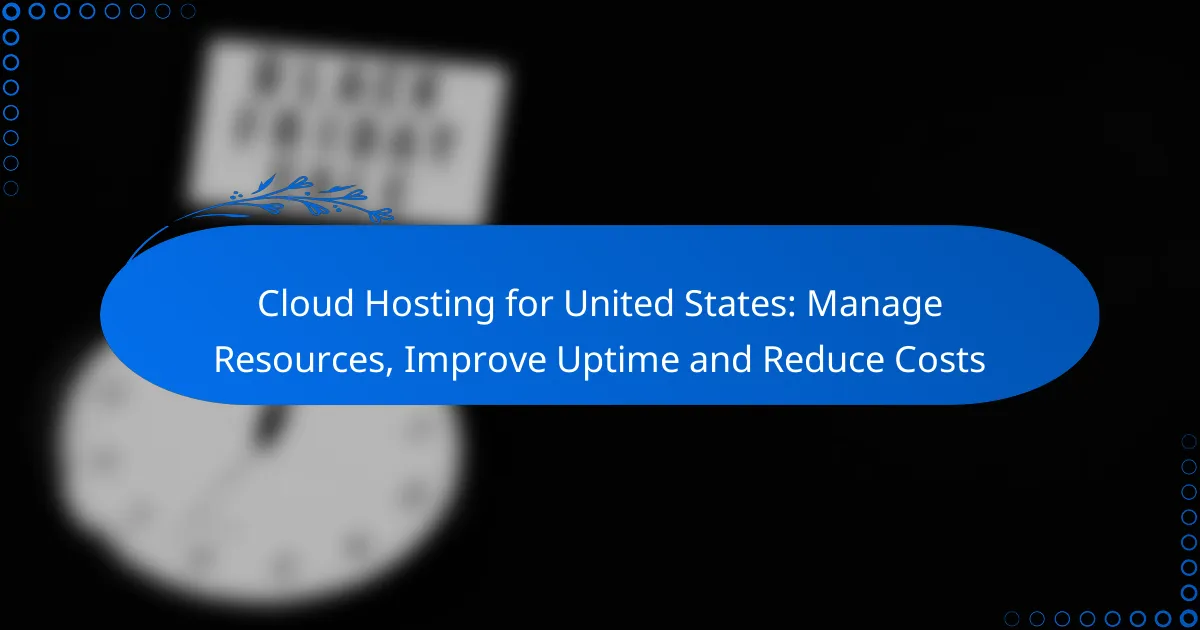Dedicated hosting in the United States provides businesses with enhanced performance and security, allowing for full server customization and effective traffic management. With the ability to support high traffic volumes and reduce latency, dedicated servers are ideal for e-commerce and resource-intensive applications. Choosing the right provider and server specifications is crucial for optimizing online presence and operational efficiency.

What Are the Benefits of Dedicated Hosting in the United States?
Dedicated hosting in the United States offers numerous advantages, making it a top choice for businesses. It enhances performance, boosts security, allows full customization, provides dedicated resources, and improves traffic control, all contributing to a stronger online presence.
With dedicated hosting, users enjoy faster load times—often under 2 seconds—and reduced latency, sometimes as low as 20 milliseconds. This speed is crucial for e-commerce sites, where even a 1-second delay can lead to a 7% drop in conversions, directly impacting sales and customer satisfaction.
Moreover, dedicated servers can handle high traffic volumes, often supporting thousands of simultaneous users without performance degradation. This reliability is vital for maintaining a robust online presence, especially during peak shopping seasons or major events.
Enhanced performance
One of the main benefits of dedicated hosting is its enhanced performance. Unlike shared hosting, where resources are split among multiple users, dedicated servers allocate all resources to a single client, resulting in performance boosts of up to 300% in some cases.
This means applications and websites on dedicated servers run faster and more efficiently, accommodating over 10,000 concurrent users without slowing down. Consequently, businesses can enhance user experience, leading to higher conversion rates and improved customer retention—key metrics in today’s competitive digital landscape.
Improved security
Improved security is another significant advantage of dedicated hosting, as dedicated servers give businesses complete control over their security protocols and configurations. This autonomy allows for the implementation of advanced security measures, such as firewalls, intrusion detection systems, and regular audits, which can reduce breach risks by up to 70%.
For instance, a financial institution can customize its security settings to ensure compliance with strict regulations, safeguarding sensitive customer data. Additionally, dedicated hosting minimizes the risk of data breaches since resources are not shared with potentially vulnerable sites, making it essential for businesses handling confidential information.
Full customization
Full customization is a key feature of dedicated hosting that attracts many businesses, allowing clients to tailor server configurations to their specific needs. For example, businesses can select their operating system, software applications, and hardware specifications, optimizing performance based on unique requirements.
This flexibility enhances operational efficiency and enables businesses to scale resources as they grow, with many providers offering scalability options that can increase server capacity by 50% or more during peak demand. This adaptability is crucial for companies looking to expand without sacrificing performance or security.
Dedicated resources
Dedicated resources are a hallmark of dedicated hosting, ensuring clients have exclusive access to all server capabilities. This means no sharing of CPU, RAM, or bandwidth with other users, which can degrade performance by up to 60% in shared environments.
For instance, a gaming company can allocate maximum resources to support high-performance gaming applications, resulting in a smoother experience for players and reducing latency to under 10 milliseconds. This exclusivity ensures consistent performance levels, vital for businesses that rely on their online presence for revenue.
Better traffic control
Better traffic control is another significant benefit of dedicated hosting, allowing businesses to manage web traffic effectively. Clients can configure their servers to handle varying traffic levels, with some dedicated servers capable of managing up to 1 million visits per month without issues.
For example, during promotional events or product launches, businesses can anticipate increased traffic and adjust their server settings accordingly, often using load balancers to distribute traffic evenly across multiple servers. This proactive approach prevents downtime and ensures a seamless user experience, underscoring the importance of dedicated hosting for growing businesses.

How to Choose a Dedicated Hosting Provider in the US?
Choosing a dedicated hosting provider in the US requires careful consideration of several key factors. Grasping server specifications, customer support, uptime guarantees, and pricing models is crucial for making an informed choice. With the dedicated hosting market expected to grow at a CAGR of 12% from 2021 to 2028, selecting the right provider can profoundly influence your business’s online presence and operational efficiency.
Evaluate server specifications
Dedicated hosting grants complete control over server resources, making it ideal for businesses with specific needs. Assess your requirements regarding CPU (preferably multi-core processors for demanding applications), RAM (at least 16GB for moderate workloads), storage (SSD vs. HDD), and bandwidth (aim for a minimum of 1 Gbps for optimal performance) to ensure your server meets current and future demands.
Consider customer support
Also, consider the scalability of server options. As your business expands, your hosting needs may evolve, so seek providers that offer flexible upgrade paths, such as increasing CPU cores or RAM without significant downtime, ensuring your infrastructure adapts seamlessly to changing requirements.
Check uptime guarantees
Server specifications form the backbone of dedicated hosting. Key components include CPU power, RAM size, storage type, and network bandwidth. For example, a high-performance CPU like an Intel Xeon or AMD EPYC is essential for resource-intensive applications, while SSD storage can enhance data access speeds by up to 300% compared to traditional HDDs. Assess your specific application needs to select the right configuration that aligns with your performance goals.
Review pricing models
Understanding these specifications helps you avoid overpaying for unnecessary resources or, conversely, underestimating your needs, which can lead to performance issues. This insight empowers you to make strategic decisions that enhance your server’s efficiency and longevity.

What Are the Top Dedicated Hosting Providers in the US?
What Are the Top Dedicated Hosting Providers in the US?
Dedicated hosting in the United States allows businesses to fully customize their servers and manage traffic effectively. This hosting type is especially beneficial for websites with high traffic or specific resource needs. Below are some of the top dedicated hosting providers in the US, known for their outstanding features and reliability.
Liquid Web
Liquid Web
Liquid Web is renowned for its high-performance dedicated hosting solutions tailored for businesses. They offer fully managed servers with 24/7 technical support, ensuring help is always at hand. With options for both Linux and Windows servers, Liquid Web caters to a diverse range of applications, making it a versatile choice across industries.
For example, their dedicated servers feature SSD storage, boosting website speed by up to 300% compared to traditional HDDs. They also provide various configurations, allowing businesses to select resources that fit their unique needs. This flexibility enables companies to scale seamlessly as traffic grows, with some clients reporting load times reduced by up to 50%.
Choosing Liquid Web can enhance website performance and minimize downtime, leading to improved customer satisfaction and retention. Their advanced security features, including DDoS protection and firewalls, safeguard sensitive data, making them ideal for e-commerce and other data-intensive applications.
HostGator
HostGator
HostGator is a popular choice for dedicated hosting, known for its affordability and user-friendly services. They offer a range of dedicated server options, including managed and unmanaged hosting plans, allowing users to choose their preferred level of control.
For instance, HostGator’s managed servers come pre-installed with essential software and automatic backups, simplifying server management. Their dedicated hosting also includes a complimentary website migration service, ensuring a smooth transition for businesses switching providers without downtime. This feature is particularly beneficial for companies looking to enhance their hosting solutions seamlessly.
Opting for HostGator can lead to significant cost savings while still providing reliable performance. Their scalable solutions allow businesses to adjust their hosting plans as needed, ensuring they only pay for the resources they use, with many users reporting savings of up to 40% compared to competitors.
InMotion Hosting
InMotion Hosting
InMotion Hosting is recognized for its exceptional customer service and robust dedicated hosting plans. They offer various server configurations, enabling businesses to customize their hosting environment to meet specific needs. Their dedicated servers are equipped with high-performance hardware, ensuring optimal speed and reliability, with some configurations supporting up to 32 GB of RAM.
For example, InMotion provides both managed and unmanaged dedicated servers, giving users the flexibility to choose their desired level of control. Their servers also come with free SSDs, significantly enhancing data retrieval speeds, crucial for businesses that rely on fast loading times to keep users engaged.
The benefits of InMotion Hosting include improved performance and reliability, which can directly impact a business’s online visibility. Their commitment to customer support ensures users have access to assistance whenever issues arise, enriching the overall experience and fostering long-term partnerships.
Bluehost
Bluehost
Bluehost is a leading provider offering a comprehensive range of hosting services, including dedicated hosting for businesses. Their dedicated servers come with various features designed to enhance performance and security, supporting traffic levels of up to 1 million visitors per month. With options for both Linux and Windows operating systems, users can choose the environment that best suits their applications.
For instance, Bluehost provides a free domain for the first year and includes a free SSL certificate with their dedicated hosting plans, potentially improving search engine rankings by up to 14%. Their servers are equipped with high-quality hardware, ensuring businesses can manage high traffic volumes without sacrificing performance.
By selecting Bluehost, businesses gain access to a reliable hosting solution that promotes growth and scalability. Their intuitive interface and strong customer support facilitate effective server management, contributing to a seamless online experience that significantly enhances user satisfaction.

How to Customize Your Dedicated Server?
Customizing your dedicated server allows you to tailor it to your specific needs, enhancing both performance and user experience. This process involves selecting the right operating system, configuring hardware settings, and installing necessary software—each crucial for optimizing server functionality. A well-customized server can improve response times by up to 50%, making it essential for businesses that depend on speed and efficiency.
Choosing the right operating system can significantly impact server efficiency and overall performance. Popular options include Linux distributions like Ubuntu and CentOS, which power over 70% of web servers globally, as well as Windows Server, known for its user-friendly interfaces. Each OS offers unique features that cater to different applications and user preferences, such as Linux’s robust security versus Windows’ extensive software compatibility.
Consider your software requirements and compatibility when selecting an operating system. If you plan to run specific applications, ensure they are supported by your chosen OS; a mismatch can lead to performance bottlenecks. This decision influences your server’s overall performance and reliability, potentially affecting uptime and user satisfaction—critical for maintaining a competitive edge.
Select operating system
Choosing the right operating system is essential for maximizing your server’s capabilities, with Linux and Windows as the two primary options. Linux is renowned for its stability and security, powering 90% of the world’s top web servers, while Windows offers user-friendly interfaces and compatibility with various software, making it ideal for businesses reliant on Microsoft applications. Understanding these strengths can guide your decision based on operational needs.
When selecting an operating system, consider your technical expertise and the applications you intend to run. For instance, if you are running a web server, a Linux distribution may be more suitable due to its lightweight nature and extensive community support, which can reduce troubleshooting time. This consideration is vital for ensuring efficient server operation that meets your specific demands.
Additionally, think about long-term support and updates. Some operating systems receive regular updates and patches, ensuring security and performance improvements; for example, Ubuntu offers LTS (Long Term Support) versions that provide five years of updates. This proactive approach can save time and resources in the long run, allowing you to focus on core business activities.
Configure hardware settings
Configuring hardware settings is crucial for optimizing your dedicated server’s performance, including selecting the right CPU, RAM, storage, and network capabilities. Each component plays a vital role in how your server handles traffic and processes data; for example, a server with 16GB of RAM can manage significantly more simultaneous connections than one with only 4GB. Understanding these specifications is essential for achieving optimal performance.
A powerful CPU can significantly enhance processing speed, with multi-core processors enabling better handling of concurrent tasks, while ample RAM allows for improved multitasking and management of simultaneous requests. Additionally, choosing SSDs over traditional HDDs can boost data retrieval times by up to 300%, enhancing overall server responsiveness and user experience.
It’s also important to consider scalability. As your needs grow, you may require additional resources; planning for scalability can prevent costly overhauls later. Configuring your hardware settings with future upgrades in mind ensures that your server can adapt to increasing demands without significant downtime or performance degradation.
Install necessary software
Installing necessary software is the final step in customizing your dedicated server, including server management tools, security applications, and any specific software required for your operations. Proper software installation ensures that your server runs smoothly and securely, with well-configured environments reducing downtime by up to 40% during peak usage times.
Common software installations include web servers like Apache or Nginx, which power over 50% of all websites, database management systems like MySQL, and security tools such as firewalls and antivirus programs. Each of these plays a critical role in maintaining server health and protecting data, making them indispensable for any dedicated server setup.
Moreover, regularly updating your software is essential for security and performance; outdated software can lead to vulnerabilities and inefficiencies, with nearly 60% of breaches attributed to unpatched vulnerabilities. Implementing a routine maintenance schedule is advisable to keep your server running optimally and safeguard against potential threats, ensuring a secure and efficient operational environment.



